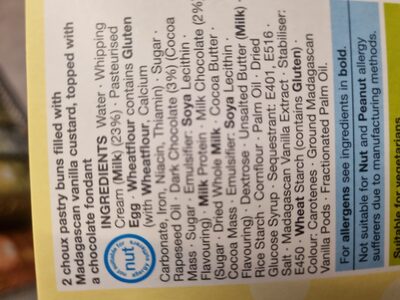Custard Choux Buns - Marks & Spencer
Ambiguous barcode: This product has a Restricted Circulation Number barcode for products within a company. This means that different producers and stores can use the same barcode for different products.
×
This product page is not complete. You can help to complete it by editing it and adding more data from the photos we have, or by taking more photos using the app for Android or iPhone/iPad. Thank you!
×
Barcode: 00597395
Packaging: Card-carton, Pet-tray
Brands: Marks & Spencer
Labels, certifications, awards: Vegetarian
Stores: Marks & Spencer
Countries where sold: United Kingdom
Matching with your preferences
Environment
Packaging
Transportation
Threatened species
Report a problem
Data sources
Product added on by kiliweb
Last edit of product page on by teolemon.
Product page also edited by inf, openfoodfacts-contributors, roboto-app, swipe-studio, yuka.sY2b0xO6T85zoF3NwEKvlk0cTYrjgj7cbh34m2e6yfOQJZ_DS_4q0I-nHKo, yuka.sY2b0xO6T85zoF3NwEKvlm0YD_bkkzv4azPTul-32IfeLbzQPNIv0tXEGas, yuka.sY2b0xO6T85zoF3NwEKvlmp7C8HviBfBLT3ulGOF78iWLZDYS9JIw5H1bKs.
If the data is incomplete or incorrect, you can complete or correct it by editing this page.








